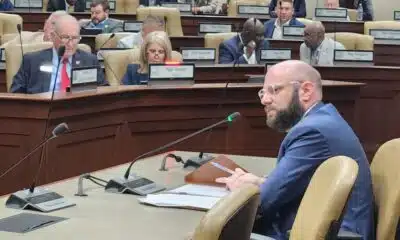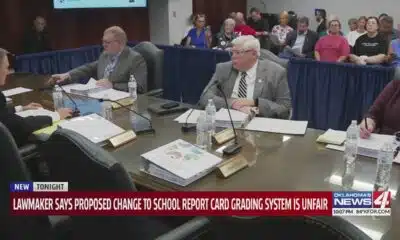News from the South - Missouri News Feed
State leaders brace for ‘heavy lift’ from Medicaid, food stamp changes
by Kevin Hardy, Missouri Independent
August 15, 2025
BOSTON — During this year’s budget cycle, Oklahoma state Sen. John Haste said lawmakers had two major things on their minds.
“Number one was tax cuts. Number two, what the hell is going on in Washington?” he told a national gathering of state lawmakers last week in Boston.
While Oklahoma lawmakers secured another round of income tax cuts, they are still wrapping their heads around the fiscal impacts of President Donald Trump’s massive spending and tax law, Haste said. The measure slashes funding for health care and food assistance.
That legislation, and other Trump actions, proved a central theme of discussion during the National Conference of State Legislatures summit, which organizers said was the largest ever gathering of state lawmakers with more than 1,600 in attendance. Aside from cutting funding, the law imposes costly new administrative burdens on states.
States are still sorting through the long-term impacts of the legislation — and what, if any, actions they can take to soften the blow.
Haste, a Republican, said concern is highest in rural areas, where reduced Medicaid funding could threaten hospitals. He said that just one provision of the law will cut $209 million in funds that help Oklahoma cover the cost of Medicaid, and that the state will need to spend an estimated $30 million on the new cost of checking eligibility twice per year.
“All of those things added together come up to a really big number,” he said, but added: “We don’t know exactly what that is.”
Missouri struggles to administer safety net programs. Congress is proposing more red tape
Lawmakers from liberal and conservative states said they are still grappling with the implications of Trump’s signature legislation. With most states boasting solid fiscal positions, some expect to cover new up-front administrative costs by tapping into strong reserve funds. But many are considering reducing services.
Nevada state Sen. Fabian Doñate, a Democrat, said state leaders will have to cut Medicaid eligibility or services since Republican Gov. Joe Lombardo has said he will oppose any efforts to raise taxes.
“That becomes a challenge, right?” Doñate said during a panel discussion on Medicaid. “Do you cut the pregnant mom or the person that makes above 180% of the federal poverty level who’s under 50, or do you cut diapers for seniors?”
At the same time, states must gear up for new bureaucratic mandates from Washington.
“Regardless of how you feel about these provisions — whether these are opportunities or challenges, fantastic or awful — regardless, it’s going to be a heavy lift for states,” said Lauren Kallins, NCSL’s senior legislative director for state-federal affairs.
She said states and organizations, including NCSL, are still awaiting detailed federal guidance on all the changes, which are spread out over several years. But states will need to react quickly.
One provision in the law requires the 40 states plus Washington, D.C., that have expanded Medicaid to check paperwork at least twice a year to ensure those enrollees are meeting new work requirements. The legislation provided states $200 million, but experts question whether it will be enough to help states implement the changes by the end of 2026.
To meet that deadline, states will need to increase outreach to Medicaid recipients and make new investments in technology, Kallins said. Similarly, states must cover new administrative costs for the Supplemental Nutrition Assistance Program, or SNAP, commonly called food stamps.
Traditionally, the federal government has fully funded SNAP benefits and split administrative costs of the program with states. The new law requires states to fund 75% of administrative costs and requires some states, depending on the accuracy of their eligibility determination, to fund a portion of benefits.
“So that’s another very significant increase for states,” Kallins said.
States in a ‘very, very strong position’
Though revenue growth is slowing, lawmakers and experts pointed out that many states currently enjoy strong budget fundamentals.
That’s true in Utah, which touts deep reserve funding and a rapidly growing economy.
Jonathan Ball, Utah’s legislative fiscal analyst, told conference attendees that the state could rely on some of its reserve for one-time administrative and technical costs associated with the federal legislation.
He said lawmakers and budget writers always have to find creative ways to solve their state’s budget puzzles.
“It’s a little bit maybe scarier, but it’s not a new sort of problem,” he said. “I think you all have the tools, we feel like we have the tools to fix it.”
Still, he said the potential for further federal funding cuts has raised many questions.
“The uncertainty about what happens in the future is huge,” Ball said.
At a separate session focusing on state budgets, financial analyst Geoffrey Buswick said most states have enviable credit ratings, meaning investors can be confident in a state’s ability to pay back debts, which affords it lower interest rates.
Buswick, the managing director and sector leader for public finance at S&P Global Ratings, said states likely have the budgetary cushion to adjust to federal policy changes.
“The states are in a very, very strong position — about the strongest we’ve ever seen,” he said.
Maryland Democratic state Sen. Karen Lewis Young didn’t buy that assessment.
She said her state touts strong reserve funds, but that those can only be used for one-time expenses and not to replace eliminated funding on an ongoing basis. Maryland is facing a huge decline in federal jobs, along with federal cuts in transportation, health and education funding.
“What am I missing in your optimism?” she asked the financial analyst.
Afterward, she told Stateline that Maryland may tout a stronger position compared with other states. But she added that even with low unemployment and a high average income, the federal legislation forces difficult decisions for lawmakers, who are constitutionally mandated to balance the state budget.
“You’ve got to cut from someplace else,” she said. “If you’re losing a pretty large share of your federal match, who do you cut?”
A ‘substantial headache’
Across the country, Democratic lawmakers hope to underscore the cuts in Trump’s new law to weigh down Republicans in state races this year and next.
Hawaii Democratic state Sen. Ronald Kouchi said lawmakers need to ensure constituents understand where the spending cuts originated.
“Who’s going to be blamed when people are left out, when people are hungry and they lose out on educational opportunities?” he asked during a panel. “If we as state legislators do not convey that it is a result of the decisionmakers in Washington, D.C., they will be at our doorstep as the place of last resort.”
Kouchi, the president of the state Senate, said Hawaii leaders had socked away more than $1 billion in reserves. But he said the state cannot fill in all the financial gaps, especially during a time when officials are trying to set aside more in disaster funding and grapple with a slowdown in tourism.
“There is no current financial ability for the state to meet the needs of everyone who is currently being impacted,” he said in an interview.
New Mexico state Rep. Meredith Dixon, a Democrat, said her state should be somewhat insulated after directing surplus oil and gas revenues into a new Medicaid Trust Fund. But she said it’s still unclear how much pressure the federal legislation will put on the state.
“We are not protected by any stretch. So we are going to have to look at how we cover those costs. … We’re still digging into everything.”
West Virginia House Speaker Roger Hanshaw, a Republican, said no one in the federal government or at the state level seemed to have a full understanding of the implications of the legislation.
“I look at this bill as Obamacare 2.0: We have to pass this bill so we can find out what’s in it,” he told Stateline.
Hanshaw said the law has some provisions that will benefit West Virginia and others that will cause a “substantial headache.”
“We have no idea yet how we’re going to respond,” he said. “I don’t want to speak for any other state … but I would speculate that’s true for nearly every other state.”
Stateline is part of States Newsroom, a nonprofit news network supported by grants and a coalition of donors as a 501c(3) public charity. Stateline maintains editorial independence. Contact Editor Scott S. Greenberger for questions: info@stateline.org.
Help Sustain Local Journalism
As a nonprofit newsroom, our articles are free for everyone to access. Readers like you make that possible. Can you help sustain our watchdog reporting today?
Missouri Independent is part of States Newsroom, a nonprofit news network supported by grants and a coalition of donors as a 501c(3) public charity. Missouri Independent maintains editorial independence. Contact Editor Jason Hancock for questions: info@missouriindependent.com.
The post State leaders brace for ‘heavy lift’ from Medicaid, food stamp changes appeared first on missouriindependent.com
Note: The following A.I. based commentary is not part of the original article, reproduced above, but is offered in the hopes that it will promote greater media literacy and critical thinking, by making any potential bias more visible to the reader –Staff Editor.
Political Bias Rating: Centrist
The content presents a balanced overview of the impacts of President Donald Trump’s tax and spending law on state budgets, featuring perspectives from both Republican and Democratic lawmakers. It highlights concerns about funding cuts and administrative burdens without overtly endorsing or criticizing any political ideology. The article maintains a neutral tone, focusing on factual reporting and diverse viewpoints from various states and political affiliations.
News from the South - Missouri News Feed
New features on all Springfield Public School buses in 2025
SUMMARY: Springfield Public Schools will have air conditioning on every bus for the 2025-2026 school year, improving student comfort. The fleet includes eight new buses with integrated seats and three-point seat belts to accommodate special needs students without separate special education buses. Safety features include higher seat backs for crash protection and an advanced eight-camera system covering inside and outside views, aiding drivers with blind spots. The “Where’s The Bus” app tracks student boarding and deboarding, providing live rosters and parent notifications. SPS earned its 25th consecutive “Total Fleet Excellence” certification. Classes start August 19.
Read the full article
The post New features on all Springfield Public School buses in 2025 appeared first on www.ozarksfirst.com
News from the South - Missouri News Feed
Reach weight loss goals with Fit Flavors’ healthy meal plan
SUMMARY: Fit Flavors offers a healthy, flavorful meal plan designed to support weight loss with tasty, balanced meals. Co-founder Jillian showcases diverse options like a farmer’s breakfast sandwich, breaded chicken gratin with cauliflower, buffalo chicken mac and cheese, Thai peanut shrimp, slow-braised beef, shredded chicken with Asian vegetables, lemon dill salmon, and chimichurri steak. Meals range around 400-450 calories, providing satiety and nutrition. The program encourages consistency, suggesting even one Fit Flavors meal daily can improve health. With about 40 meal options and customizable bulk choices, Fit Flavors makes healthy eating easy. Discounts are available for subscriptions via fitflavors.com.
SPONSORED – Fit Flavors, a St. Louis-based company, is helping you achieve your weight loss goals with its new Weight Loss Meal Plan, offering meals under 450 calories.
The Weight Loss Meal Plan by Fit Flavors has eight meals and six snacks, all designed to be nutritious and satisfying while keeping calorie counts low. Each meal is packed with fiber, protein, and vegetables, providing a balanced diet for those looking to lose weight.
Consistency is key, and the meal plan helps provide with its structure.
Enjoy a 10% discount when purchasing the meal plan compared to buying meals individually. Subscribing to the plan offers even more savings, totaling over 15% off the ticket price.
Fit Flavors operates seven locations across St. Louis, where customers can pick up their orders, and meals can also be ordered online for home delivery.
Sponsored content disclaimer: The information and advice displayed in this story are those of individual sponsors or guests and not Nexstar Media Group, Inc.
News from the South - Missouri News Feed
KCATA approves contract to keep bus service running
SUMMARY: The Kansas City Council unanimously approved $78 million in funding for a 12-month contract with the Kansas City Area Transportation Authority (KCATA), ensuring bus service through April. An additional $15 million is expected to be approved. The contract, ratified after KCATA’s line of credit expired, maintains current bus routes and plans to reinstate fares in 2026, with free fares for qualifying low-income riders. Local leaders emphasize the contract’s importance for transit equity, avoiding service disruption for vulnerable residents. However, the future of the on-demand IRIS service remains uncertain, with funding discussions focusing on Clay and Platte Counties.
The post KCATA approves contract to keep bus service running appeared first on fox4kc.com
-
News from the South - Oklahoma News Feed6 days ago
Former payroll director ordered to prison, must repay district nearly $500,000
-
News from the South - Tennessee News Feed6 days ago
Dollywood shares hints about new attraction coming in 2026
-
News from the South - Georgia News Feed6 days ago
GBI identifies Emory University, CDC shooting suspect
-
News from the South - Louisiana News Feed7 days ago
Rural emergency rooms are increasingly run without doctors, experts say
-
News from the South - Missouri News Feed7 days ago
Police found a man stabbed to death in St. Louis. They arrested his stepson in Minnesota a day later
-
News from the South - Georgia News Feed6 days ago
Patrick Joseph White: Who is the accused Emory and CDC shooter?
-
News from the South - South Carolina News Feed6 days ago
Governor to set limits on SNAP benefits.
-
News from the South - Oklahoma News Feed7 days ago
Lawmaker says proposed change to school report card grading system is unfair










































